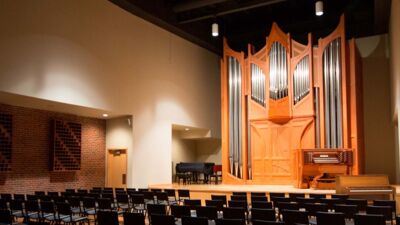Equipping the next generation of leaders in the church's song

Concordia University, Nebraska is known for preparing musicians to serve and glorify God through the study and performance of music. This semester, the university has an unprecedented number of students - twenty-eight! - studying organ.
“Sometimes people in the organ world outside Concordia are taken by surprise when they hear how many students we have studying organ, and they ask how we do that,” said Concordia University Professor of Music Dr. Jeffrey Blersch. “I would say it’s because of our strong focus on church work and church music as well as our reputation for excellence in music. The students that we draw are people that really want to serve their church, and they know they can learn do that here. It’s an important task, and it’s an honor for us to work with them and prepare them for these vocations. We have a great faculty here, and we complement each other really well in terms of strengths. We share the same vision and the same passion for teaching.”
Blersch has served at Concordia Nebraska for 21 years. He is the university’s primary organ teacher, he conducts the university’s Cantamus Women’s Choir, and he teaches music theory classes for music majors. His wife Carla teaches piano lessons at the university. Paul Soulek and Dr. Carol McDaniel also teach organ lessons at Concordia Nebraska.
Organ students at the university come from a variety of unique backgrounds and are at various stages in their organ studies.
“There are some students who have pretty extensive music experience when they come here,” said Blersch. “But we also have some who are starting from square one. A lot of them are church music majors, but some are music education majors who want to teach in a Lutheran school, others are pre-seminary students who will go on to be pastors. But sometimes they are students who are just interested in music and the organ and want to learn.”
Organ students may sign up for one or two 30-minute lesson blocks each week. Students register for lessons in the same way they register for classes. As soon as students are proficient in hymn playing, they are added to the university’s chapel organist rotation list. Students may also play for the university’s Tuesday and Thursday evening campus worship services. Student organists also are frequently asked to play at campus-adjacent St. John Lutheran Church, at nearby churches in Seward County, in Lincoln and beyond.
“I get emails all the time from congregations looking for help,” said Blersch. “There are more churches seeking full-time musicians than we have students or graduates for. Our goal in this church music program is to equip the next generation of leaders in the church’s song. In our church, this is vitally important. Lutherans have always emphasized the importance of singing for the proclamation of the Gospel and for teaching. Music is a wonderful way to internalize what we teach and confess. It has a very important role.”
Blersch said that the university’s music program was experiencing growth prior to 2020 when COVID-19 caused the cancellation of many in-person gatherings including recitals and performances and impacted many other daily activities. He said the university has recovered from the temporary disruption and interest in the university’s music offerings is again on the rise.
The university’s faculty and students are eagerly anticipating the completion of the new 46,544-square foot, state-of-the-art Music Center, which will feature 22 practice rooms, 12 teaching studios, recording studio, theater, recital hall and much more. The long-awaited Music Center will house 10 practice organs as well as the Casavant pipe organ in its recital hall. During music building construction, students have been practicing on rented electric organs housed in various places around campus. Weller Chapel’s pipe organ and St. John’s pipe organ are sometimes available for student use, as well.
“We are so excited about this new building. We cannot wait to get into it! This building was specifically designed for music education,” said Blersch. “The students are so excited about the practice organs. During this time of construction and temporary disruption, the students have adapted really well. They love what they do and are determined to make it work, no matter what.”
Blersch explained that studying organ is very different from studying other instruments.
“My students that are first exploring organ always come to the quick realization that while people think it is similar to the piano, it is really much different. The piano is categorized as a percussion instrument, but the organ is a wind instrument. Playing with your feet is actually not the most difficult part, really it’s reworking your keyboard technique. And as we’ve learned with this construction project, one of the big challenges with an organ is the instrument is not portable!”
Many of Concordia Nebraska’s music students are practicing and playing more than one instrument and many also singing in one of the university’s choirs, as well.
“Concordia Nebraska has always had a strong focus on preparing future church workers, whether it’s musicians, teachers, DCEs, deaconesses or pastors, for much longer than I have been here,” said Blersch. "We have a strong, strong church work program, and we have built a music department that provides an excellent education and excellent resources and excellent opportunities for students to become better musicians and stronger people. The energy and enthusiasm from our program is infectious. When students come to visit us, they sense that something exciting is happening in our department, and they want to be a part of it.”
Interested in being a part of Concordia's music program? Learn more here.
Related Stories


